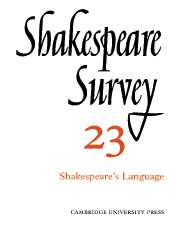Book contents
- Frontmatter
- Shakespeare and the Tune of the Time
- Some Functions of Shakespearian Word-formation
- Guide-lines for Interpreting the Uses of the Suffix ‘-ed’ in Shakespeare’s English
- Shakespeare’s Use of Colloquial Language
- Words, Action, and Artistic Economy
- ‘Antony and Cleopatra’: the Limits of Mythology
- Shakespeare’s ‘War with Time’: the Sonnets and ‘Richard II’
- Shakespeare and Christian Doctrine: Some Qualifications
- Shakespeare’s Poets
- The Text of Coleridge’s 1811–12 Shakespeare Lectures
- Shakespeare Studies in German: 1959–68
- A Neglected Jones/Webb Theatre Project: ‘Barber-Surgeons’ Hall Writ Large
- Interpretation or Experience? Shakespeare at Stratford
- 1 Critical Studies
- 2 Shakespeare’s Life, Times, and Stage
- 3 Textual Studies
- Index
- Plate section
Interpretation or Experience? Shakespeare at Stratford
Published online by Cambridge University Press: 28 March 2007
- Frontmatter
- Shakespeare and the Tune of the Time
- Some Functions of Shakespearian Word-formation
- Guide-lines for Interpreting the Uses of the Suffix ‘-ed’ in Shakespeare’s English
- Shakespeare’s Use of Colloquial Language
- Words, Action, and Artistic Economy
- ‘Antony and Cleopatra’: the Limits of Mythology
- Shakespeare’s ‘War with Time’: the Sonnets and ‘Richard II’
- Shakespeare and Christian Doctrine: Some Qualifications
- Shakespeare’s Poets
- The Text of Coleridge’s 1811–12 Shakespeare Lectures
- Shakespeare Studies in German: 1959–68
- A Neglected Jones/Webb Theatre Project: ‘Barber-Surgeons’ Hall Writ Large
- Interpretation or Experience? Shakespeare at Stratford
- 1 Critical Studies
- 2 Shakespeare’s Life, Times, and Stage
- 3 Textual Studies
- Index
- Plate section
Summary
In a recent review of the interpretations of Edward II and Richard II by the exciting young actor, Ian McKellen, Ronald Bryden quoted Richard Mansfield. The capacity required for the great Shakespearian roles is described thus:
When the fire-bell rings, the horses have got to come out and rattle and race down the street, and rouse the town.
It is heartening to note such words being used to indicate a young actor's quality yet, with a start, we realize how rarely they can be applied now. On the other hand, it is not long ago that we found them echoing in our minds when we experienced the best of Wolfit, Gielgud and Olivier.
In the summer number of Flourish J. C. Trewin amplifies the evidence of past glory. He recalls Ernest Milton's ' orchestration of the “Rogue and Peasant slave” soliloquy', and Maurice Evans' 'sweeping gesture at “Northumberland thou ladder'”. Richard Mansfield's strident image is matched by Trewin's recalling of 'Edith Evans' Millamant voice— fan spread and streamers out'.
Trewin is not indulging in romantic nostalgia. His point is firmly made.
Today, in Shakespeare particularly, there is a curious reluctance to 'give'. It is as if an actor or actress were in the ante-room, refusing to go further, refusing to fling the door wide . . . It is curious, for there are many current actors of high spirit and intelligence. Can it be that they and their directors—who so often have the final word—are intent on interpreting a play to us rather than letting us experience it.
- Type
- Chapter
- Information
- Shakespeare Survey , pp. 131 - 136Publisher: Cambridge University PressPrint publication year: 1970

